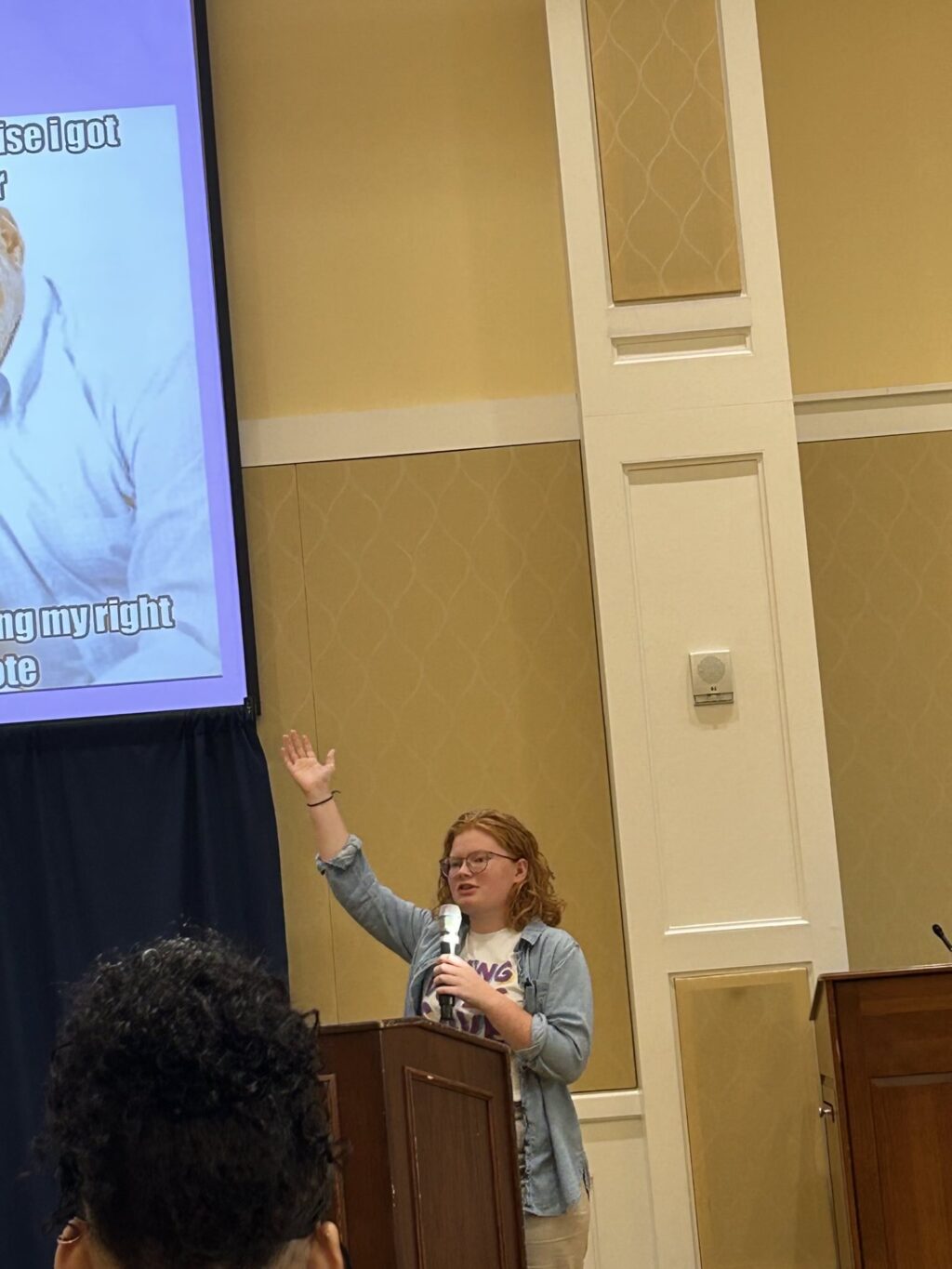Civic engagement forum stresses importance of youth vote and provides general election knowledge
4 min read
Kate McDaid speaks in front of students and faculties about the importance of civic engagement. | Photo courtesy of Kate McDaid.
by KENNEDY NICHOLSON
Staff Writer
On Thursday, Sept. 7, the James Farmer Multicultural Center, the Center for Community Engagement and Students Educating and Empowering for Diversity co-sponsored a forum on civic engagement for UMW students, faculty and staff, as well as members in the greater Fredericksburg area to attend. On the speaking panel were: Jared McDonald, Kate McDaid, Derrick Lewis and Jessica Atkinson, and the event consisted of an explanation of civic engagement as well as each speaker’s opinion on it.
The speakers talked about voting and registration, discussing the various factors that play a part in why individuals don’t vote. Assistant Professor Jared McDonald, who teaches in the Political Science department, spoke on two of these factors.
The first: Some people can’t vote because of tangible costs. The tools needed to vote, such as access to the internet to register and access to transportation to the polls cost money, which acts as a barrier against their ability to vote.
The second: The youth is more mobile and losing interest in wanting to vote because they believe their one vote or opinion won’t make enough of a difference in any final decision or the turnout of things. The lack of effort toward making a difference is taking a toll on Virginia’s turnouts.
Jessica Atkinson, the director of elections for Fredericksburg, spoke on how the majority believes that the smaller turnouts pull in a larger crowd than the bigger ones, but the reality is that they both disappoint.
Derrick Lewis, the national field organizer for the NAACP, spoke last. He talked about the NAACP, its impact and its position within civic engagement using three points to highlight these functions: volunteer recruitment, voter registration and voter turnout. His message relayed the idea that, as a community, the top priority is to provide volunteers with help and support throughout the process of registration so that more people are ready and able to vote.
“If you don’t do anything about it, you can’t complain about it,” said Kate McDaid, one of the speakers, a UMW alumnus and field organizer for NextGen, which is an organization that works to mobilize the youth vote. “I have this opportunity and I know I have this opportunity and if I don’t do anything about it, now especially, I don’t get to say, ‘this sucks’ if I’m not actively trying to make things better,” said McDaid.
At the end of the event, the audience was able to ask questions and make comments, which ranged from, “Can you tell me more about the voting process?” to personal opinions in regard to the 15-week abortion ban that was put in place.
After the event was over, Derrick Lewis and Kate McDaid responded to two related questions: “What is a community to you?” and “What makes a strong community?”
Lewis said, “A group of people and in that definition, itself is unity. They have principles, a set of expectations in regard to how they treat and respect each other, as well as how they interpret behavior; those who identify with the same values. Advocating for the issues will help us thrive as a community.”
McDaid said, “I think community has a lot of different definitions depending on what you’re trying to do, but community as in having priorities that aren’t necessarily the same but making sure everyone does have priorities that can be met. Making sure progress is made.”
While civic engagement was the main topic, the event also included an explanation of the structure of Virginia’s state government to contextualize the concept. The speakers explained that the General Assembly writes laws that govern the Commonwealth of Virginia, and it also establishes the state’s budget.
The General Assembly is composed of two houses: the House of Delegates and the Virginia Senate. Both play major roles in the law-making process, as they compose the legislative branch of government and work with Virginia Governor Glenn Youngkin to make appropriate decisions relating to bills on policy and the budget.
The House of Delegates, presided over by Speaker of the House Todd Gilbert, is Republican-controlled, and the Senate has a Democratic majority led by Sen. Dick Saslaw. As a whole, the General Assembly delivers recommendations on issues and manages their approval.
Matthew Clark, a sophomore political science major, attended the event because he wanted to hear from locals about why voting matters to them.
“You hear a lot from big names in politics, but never as much from people who understand the specific needs of the community you live in,” he said.
After the event, Clark reflected on what he took away from listening to the speakers. He said, “I learned how important local elections were. You can see the impact in your own community to a much higher degree than at the federal level.”
The candidates for the 65th District of the Virginia House of Delegates are Lee Peters III (R) and Joshua Cole (D). Joel Griffin (D), Tara Durant (R) and Monica Gary (I) are running for Senate District 27. The last day to vote in the general elections is Nov. 7.


